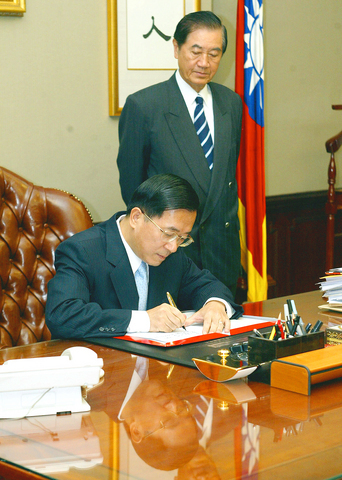The US said it was satisfied with the way that President Chen Shui-bian (陳水扁) dealt with the National Unification Council and guidelines on Monday, saying that his action in mothballing the council did not amount to a unilateral change in the status quo, thus satisfying Washington's main concern in relation to the dispute.
"We welcome President Chen's reaffirmation of his administration's commitment to cross-strait peace and stability, and Taiwan's commitment to the pledges that President Chen made in his inaugural address to not unilaterally alter the status quo in the Taiwan Strait," White House spokesman Scott McClellan told reporters in Washington.
Chen's decision "did not abolish the National Unification Council," McClellan said.

PHOTO: CNA
The laudatory tone was echoed by Adam Ereli, the State Department spokesman, who told his daily press briefing that Chen "reaffirmed his continuing commitment to the pledges he made in his 2000 inaugural address not to change the status quo across the Straits [sic]."
But Ereli indicated that the wording Chen used in his announcement may not have completely erased the mistrust that the issue has stirred up.
"We attach great importance to that commitment," Ereli said, "and we'll be following his follow-through carefully."
"And we certainly look forward to [Chen] fulfilling those commitments," he said.
McClellan and Ereli also called on Beijing to open a dialogue with Chen and his government to work out differences on cross-strait policy, indicating that they felt Chen's compromise on the unification issue should be reciprocated by Beijing by opening dialogue with Chen's government.
"The United States continues to also stress the need for Beijing to open a meaningful dialogue with the duly elected leadership in Taiwan that leads to a peaceful resolution of their differences," McClellan said.
Ereli declined to say whether the US considered the unification council issue closed.
"For us, the episode is closed or the issue is closed when parties on both sides of the Straits [sic] resolve their differences [through cross-strait dialogue," he said.
The wording of Chen's announcement that the council will "cease functioning" and the guidelines will "cease to apply" was the result of weeks of intense pressure exerted on Chen by the Bush administration not to abolish the council.
After his Lunar New Year speech late last month, when Chen first announced that he was considering scrapping the council and guidelines, the US complained loudly that such a move would unilaterally change the "status quo" across the Taiwan Strait, breaking a bedrock principle of US cross-strait policy.
After weeks of jawboning -- including the dispatch of high-level US officials to Taipei for talks with Chen, the details of which remain secret -- the US managed to get Chen to back away from his abolition plan.
But US officials refused to say whether the words Chen used on Monday were dictated by them.
The logjam was broken several days ago, when Chen agreed to "freeze," rather than "abolish," the workings of the council and applicability of the guidelines.
It is not clear what Chen got in return for bowing to US pressure. US officials say there was no quid pro quo, such as a pledge by Washington to lean harder on Beijing to open talks with the Chen government.
But Ereli asserted that there cannot be meaningful cross-strait dialogue "if there isn't the confidence between both sides that the other one isn't taking unilateral steps."
According to Ereli, Chen's words amounted to "freezing" the unification mechanism, an acceptable compromise between the conflicting desires of Chen and Washington.

Japanese footwear brand Onitsuka Tiger today issued a public apology and said it has suspended an employee amid allegations that the staff member discriminated against a Vietnamese customer at its Taipei 101 store. Posting on the social media platform Threads yesterday, a user said that an employee at the store said that “those shoes are very expensive” when her friend, who is a migrant worker from Vietnam, asked for assistance. The employee then ignored her until she asked again, to which she replied: "We don't have a size 37." The post had amassed nearly 26,000 likes and 916 comments as of this

US President Donald Trump said "it’s up to" Chinese President Xi Jinping (習近平) what China does on Taiwan, but that he would be "very unhappy" with a change in the "status quo," the New York Times said in an interview published yesterday. Xi "considers it to be a part of China, and that’s up to him what he’s going to be doing," Trump told the newspaper on Wednesday. "But I’ve expressed to him that I would be very unhappy if he did that, and I don’t think he’ll do that," he added. "I hope he doesn’t do that." Trump made the comments in

Tourism in Kenting fell to a historic low for the second consecutive year last year, impacting hotels and other local businesses that rely on a steady stream of domestic tourists, the latest data showed. A total of 2.139 million tourists visited Kenting last year, down slightly from 2.14 million in 2024, the data showed. The number of tourists who visited the national park on the Hengchun Peninsula peaked in 2015 at 8.37 million people. That number has been below 2.2 million for two years, although there was a spike in October last year due to multiple long weekends. The occupancy rate for hotels

Taiwanese can file complaints with the Tourism Administration to report travel agencies if their activities caused termination of a person’s citizenship, Mainland Affairs Council Minister Chiu Chui-cheng (邱垂正) said yesterday, after a podcaster highlighted a case in which a person’s citizenship was canceled for receiving a single-use Chinese passport to enter Russia. The council is aware of incidents in which people who signed up through Chinese travel agencies for tours of Russia were told they could obtain Russian visas and fast-track border clearance, Chiu told reporters on the sidelines of an event in Taipei. However, the travel agencies actually applied